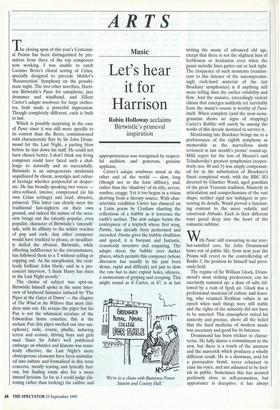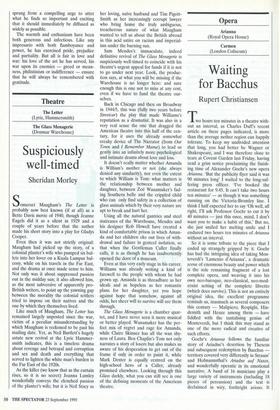ARTS
Music
Let's hear it for Harrison
Robin Holloway acclaims Birtwistle's primeval inspiration The closing span of this year's Centenni- al Proms has been distinguished by pre- mières from three of the top composers now working. I was unable to catch Luciano Berio's choral setting of Celan, specially designed to precede Mahler's `Resurrection' Symphony on the penulti- mate night. The two other novelties, Harri- son Birtwistle's Panic for saxophone, jazz drummer and windband, and Elliott Carter's adagio tenebroso for large orches- tra, both made a powerful impression. Though completely different, each is built to last.
Which is possibly surprising in the case of Panic since it was still more specific to its context than the Berio, commissioned with characteristic flair by Sir John Drum- mond for the Last Night, a parting blow before he lays down his staff. He could not have chosen better. I don't think any living composer could have faced such a chal- lenge so naturally and so successfully. Birtwistle is an unregenerate modernist unpalliated by charm, nostalgia and cultur- al heritage whether purposeful or desper- ate. He has broadly speaking two voices ultra-refined, intense, compressed (in his own Celan settings) and loud, abrasive, primeval. This latter can clearly meet the traditional last-nighters on their own ground, and indeed the nature of the occa- sion brings out the latently popular, even populist, character of Birtwistle's 'uncouth' side, with its affinity to the wilder reaches of pop and rock. Any other composer would have truckled to please, or steadfast- ly defied the obvious. Birtwistle, while affecting indifference to the circumstances, has followed them to a T without selling or copping out. As his saxophonist, the reck- lessly brilliant John Harle, said in a pre- concert interview, 'I think Harry has risen to the Last Night secretly.'
The choice of subject was spot-on. Birtwistle himself spoke in the same inter- view of boyhood fantasies induced by 'The Piper at the Gates of Dawn' — the chapter of The Wind in the Willows that most chil- dren miss out. He retains the piper but his Pan is not the whimsical creature of the Edwardian home counties; this is the archaic Pan (his pipes swelled out into sax- ophone), rude, coarse, phallic, inducing terror and ecstasy, driving boys and girls mad. Since Sir John's well publicised embargo on whistles and klaxons was mani- festly effective, the Last Night's more obstreperous elements have been assimilat- ed into culture and formalised in this terse concerto, mostly tearing and lyrically furi- ous, but finding room also for a more inward lyricism. So far as I could judge (lis- tening rather than looking) the calibre and appropriateness was recognised by respect- ful audition and generous, genuine applause.
Carter's adagio tenebroso stood at the other end of the world — slow, long (though not in the least diffuse); and, rather than the 'shadowy' of its title, severe, sombre, craggy. Yet it too begins in a vision deriving from a literary source. With char- acteristic erudition Carter has chanced on a Latin poem by Crashaw charting the reflections of a bubble as it traverses the earth's surface. The new adagio forms the centrepiece of a triptych whose first wing, Partita, has already been performed and recorded. Partita gives the bubble ebullition and speed; it is buoyant and fantastic, ceaselessly inventive and enquiring. The adagio steers the bubble over darker places, which permits this composer (whose discourse has usually in the past been dense, rapid and difficult) not just to slow the rate but to dare exploit holes, silences, a momentum of groping and creeping. This might sound as if Carter, at 87, is at last `We're in a chain with Battersea Power Station and County Hall.' writing the music of advanced old age, except that there is not the slightest hint of feebleness or hesitation even when the gaunt melodic lines gutter out or lock tight. The eloquence of such moments (reminis- cent to this listener of the uncompromis- ingly rock-hard material of the last Bruckner symphonies) is if anything still more telling than the earlier volubility and flow. And the massive, exceedingly violent climax that emerges suddenly yet inevitably from the music's course is worthy of Panic itself. When complete (and the near-nona- genarian shows no signs of stopping) Carter's Bubble will surely be among the works of this decade destined to survive. it.
Mentioning late Bruckner brings me to a performance of the eighth symphony as memorable as the marvellous ninth reviewed in last month's proms' round-up. Mild regret for the loss of Mozart's and Tchaikovsky's greatest symphonies (respec- tively nos. 40 and 5) was amply compensat- ed for in the substitution of Bruckner's finest completed work, with the BBC SO directed by Gunther Wand, aged guardian of the great Teutonic tradition. Masterly in articulation and comprehension of the vast shape, neither rigid nor indulgent in pre- senting its details, Wand proved a fascinat- ing contrast to the more volatile and emotional Abbado. Each in their different ways gazed deep into the heart of the romantic sublime.
With Panic still resonating in our sore- but-satisfied ears, Sir John Drummond bows out of public life; from next year the Proms will revert to the controllership of Radio 3, the position he himself had previ- ously held.
The regime of Sir William Glock, Drum- mond's most striking predecessor, can be succinctly summed up: a dose of salts fol- lowed by a rush of fresh air. Glock *as a professional musician1of culture and learn- ing, who retained Reithian values in an epoch when such things were still stable and the rights of the minority did not have to be asserted. This atmosphere suited his austerity and gravitas, above all the belief that the hard medicine of modern music was necessary and good for its listeners.
Drummond has been trickier to charac- terise. He fully shares a commitment to the new, but there is a touch of the amateur and the maverick which produces a wholly different result. He is a showman, avid for a provocative brawl, never reluctant to raise his voice, and not ashamed to be fool- ish in public. Sometimes this has seemed perilously close to self-promotion, but appearance is deceptive: it has always sprung from a compelling urge to utter what he finds so important and exciting that it should immediately be diffused as widely as possible.
The warmth and enthusiasm have been both generous and infectious. Like any impresario with both flamboyance and power, he has exercised pride, prejudice and partiality. But all is fair in love and war: his love of the art he has served, his war upon its enemies — greed or mean- ness, philistinism or indifference — ensure that he will always be remembered with gratitude.



































































 Previous page
Previous page